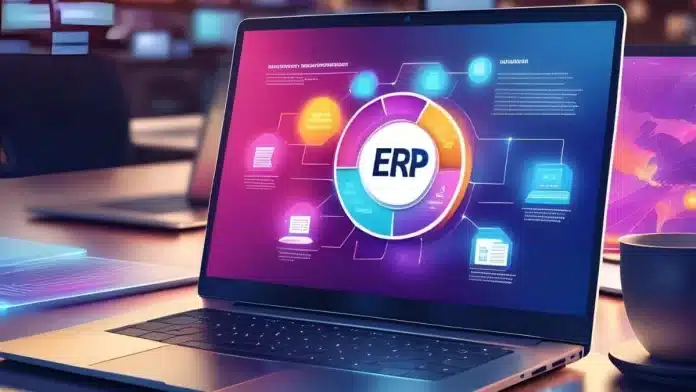Successfully managing a B2B business requires more than hard work—it demands the suitable systems to streamline operations. With rising client expectations, an ERP can be invaluable in ensuring efficiency and growth.
Many B2B businesses lacking ERP software face issues such as data silos, delayed workflows, and limited visibility into key metrics. These challenges make it difficult to scale operations smoothly and respond to market demands.
A study in the Philippines revealed that companies not adopting ERP systems face significant challenges in operational efficiency. The study showed that 60% of businesses without ERP struggle with inventory management and order processing, negatively impacting customer satisfaction and profitability.
This article explores the top 8 B2B ERP software options available for businesses in the Philippines. Discover which ERP can help your business overcome challenges and drive growth.
Table of Contents

Key Takeaways
|
What is an Enterprise Resource Planning System (ERP)?
Enterprise Resource Planning (ERP) is a powerful application designed to automate essential business processes across an organization. Using a centralized database, ERP collects and aggregates input from various divisions, such as accounting, manufacturing, marketing, sales, and human resources.
Through this collected data, ERP provides valuable insights for B2B enterprise software, enabling leaders to analyze performance issues and identify areas for improvement. This optimization process allows businesses to streamline operations and maximize profits.
For larger B2B businesses, especially those involved in B2B eCommerce ERP operations, an ERP system can be customized to align with the industry’s unique demands. This flexibility ensures that B2B systems meet specific business needs, creating an efficient, tailored solution for complex enterprise environments.
What are the Key ERP Modules for B2B eCommerce?

Before diving into the specific modules within an ERP system, it’s essential to understand how these tools drive success in B2B eCommerce. ERP systems for B2B streamline complex workflows by integrating critical business processes into a cohesive platform.
Below are the key modules that make ERP system an invaluable asset for businesses:
- Accounting: This module streamlines financial management, simplifying tasks like invoicing, expense tracking, and financial reporting. Automated processes ensure accuracy, efficiency, and better financial oversight for your business.
- Sales: The sales module empowers your team to manage leads, track sales, and close deals effectively. It provides insights into customer buying patterns, helping you make data-driven decisions to boost revenue.
- CRM (Customer Relationship Management): The CRM module strengthens customer relationships by centralizing client information, tracking interactions, and optimizing communication. It enhances customer satisfaction and loyalty, leading to increased retention and growth.
- Purchasing: This module simplifies procurement processes, from purchase orders to vendor management, ensuring timely and cost-effective purchasing. It promotes transparency, helping you manage supplier relationships more efficiently.
- Inventory: The inventory module helps you monitor stock levels, optimize reorder points, and reduce storage costs. It enables real-time inventory tracking, ensuring products are always available when customers need them.
- HRM (Human Resource Management): This HRM module allows you to manage employee data, payroll, attendance, and performance, streamlining HR processes and improving team management. It supports a more organized, productive, and engaged workforce.
- Asset Control: This module will help you track and maintain valuable assets, extending their lifespan and reducing unexpected costs. Detailed records enhance operational efficiency and maximize asset utilization.
Each module plays a vital role in the operational excellence of B2B eCommerce ERP systems, enhancing business productivity and decision-making. By implementing an ERP solution with these modules, companies can effectively drive growth in today’s fast-paced market.
The 8 Best B2B ERP Systems in Philippines
As businesses in the Philippines seek ways to enhance efficiency, B2B ERP systems are crucial for streamlined operations and improved decision-making. Here’s a closer look at the best ERP software that offer robust features for B2B environments and eCommerce integrations.
1. HashMicro’s B2B ERP system
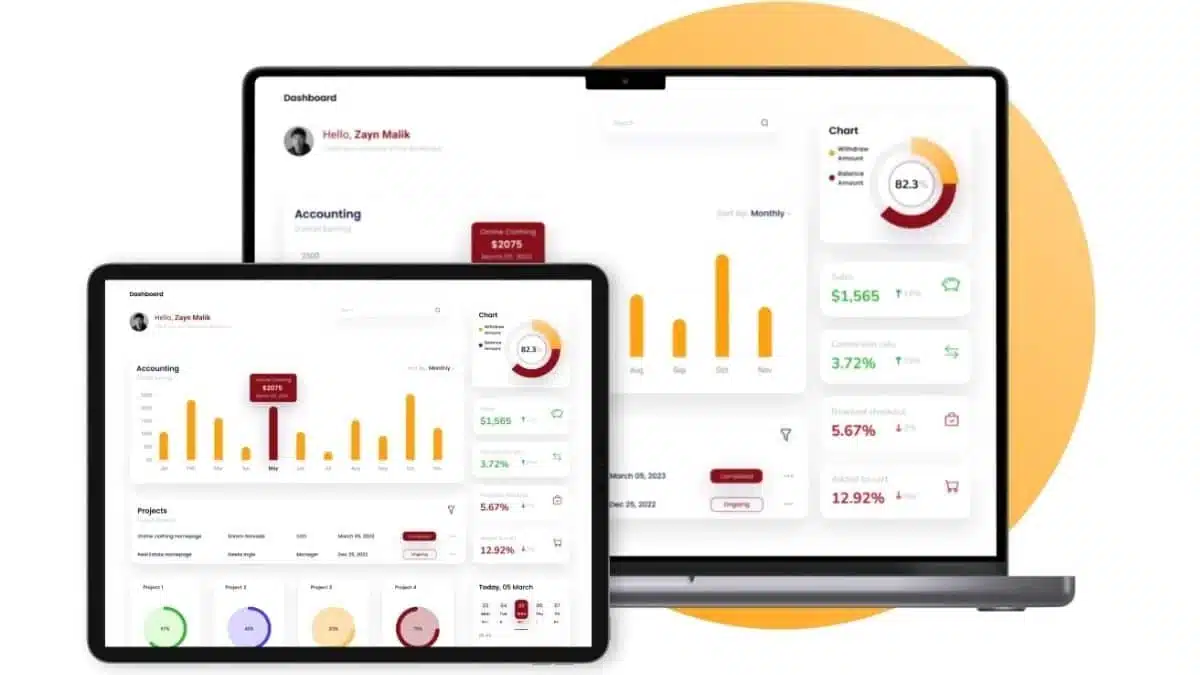
HashMicro is a leading ERP system provider in Southeast Asia, offering a robust Bank Reconciliation System that seamlessly integrates with diverse accounting platforms. This ERP solution automates reconciliation tasks, minimizing errors and enhancing financial accuracy for businesses of all sizes.
A top choice for Filipino companies with complex operations that require a precise, integrated ERP system to streamline and optimize business processes.
Why we recommend this ERP system: HashMicro excels in optimizing the bank reconciliation process, ensuring precise financial records and reducing manual workload. It provides automation tools for transaction matching, account balance monitoring, and real-time financial reporting, making it suitable for businesses with varying needs.
If you’re interested in learning more about HashMicro’s capabilities, you can explore a free demo from this leading ERP system provider and experience the advantages of an integrated and customizable platform.
To dive into the specific features of HashMicro’s ERP System and see how it can elevate your end-to-end business operation:
- Built-in Business Intelligence: HashMicro ERP integrates powerful BI tools like Pivot, KPI Scorecard, Custom BI, and Dashboard Ninja, enabling businesses to analyze data effectively. This feature empowers companies to make data-driven decisions by providing real-time insights in a user-friendly dashboard.
- WhatsApp Integration: This feature streamlines communication within businesses, making it faster and more efficient. It facilitates seamless interactions directly through WhatsApp, enhancing connectivity with clients and internal teams.
- Sheet Management: HashMicro ERP automates and manages business documents in spreadsheet format, ensuring efficiency and data security. It also integrates data across modules, allowing for consistent and accurate analysis.
- Access-Level: This feature secures sensitive data by setting access limits for each employee, safeguarding important information from unauthorized viewers. Managers benefit from clear visibility into all staff activities, promoting accountability.
- AI-Generated Report & Explainer: The AI tool generates comprehensive, easy-to-understand reports and suggests actionable steps. It also identifies suspicious cost anomalies, acting as a virtual assistant to support informed decisions.
- Restricted User: This feature ensures data security by requiring users to connect via the office Wi-Fi. It restricts access to authorized locations only, reducing the risks of unauthorized access or data theft.
- Mobile Apps: The mobile app supports remote work and keeps employees connected to the ERP system from anywhere. This flexibility boosts productivity, making it easier for teams to manage tasks on the go.
- Flexible Hosting Methods: HashMicro ERP offers both Cloud and On-premise hosting options, providing scalability and flexibility. This allows companies to choose between enhanced control or high security, adapting to their unique needs.
| Advantages | Disadvantages |
| User-friendly interface | It has many complex features that require further consultation to find the right solution |
| Flexible module options | |
| Strong customer support | |
| Advanced reporting tools |
2. Microsoft Dynamics 365
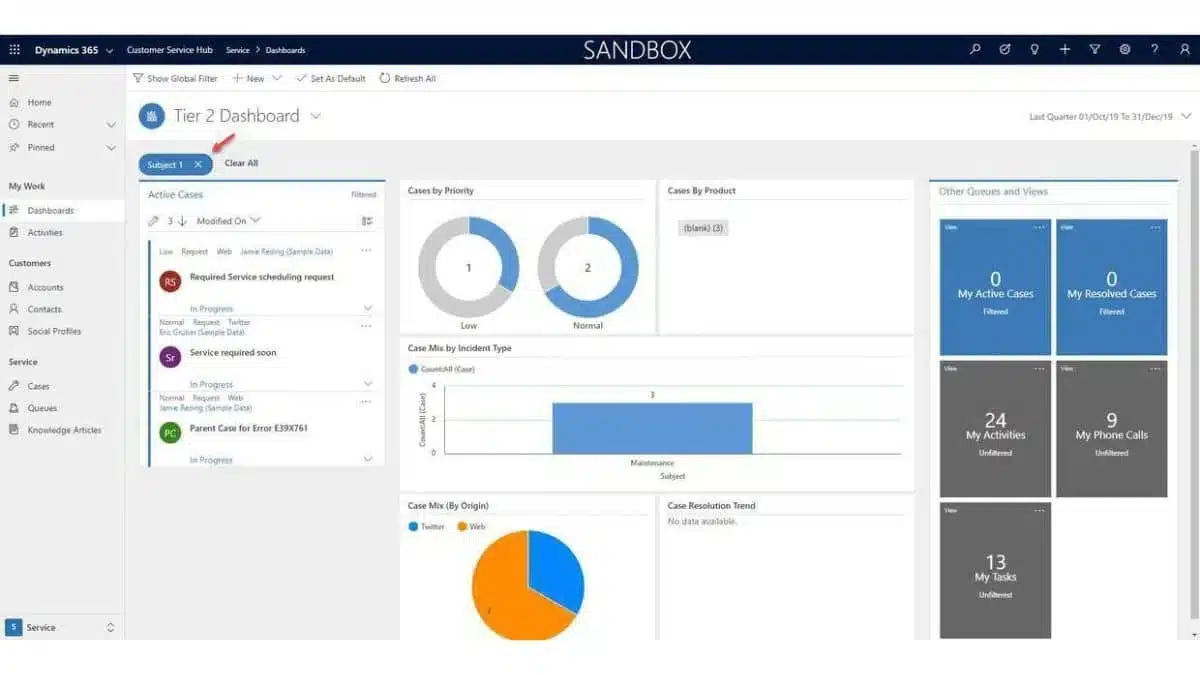
Microsoft Dynamics 365 is a trusted B2B ERP system that seamlessly integrates with other Microsoft tools. With a cloud-first approach, Dynamics 365 provides robust solutions for data analysis, customer relationship management, and workflow automation, making it a popular choice among enterprise businesses in the Philippines.
Key Features:
- Seamless Microsoft Office integration
- Scalable cloud infrastructure
- Advanced AI-powered insights
- Comprehensive customer relationship management (CRM)
| Advantages | Disadvantages |
| Strong integration with Office | High learning curve |
| Scalable and flexible | Complex setup requirements |
| AI-driven insights | |
3. Oracle NetSuite
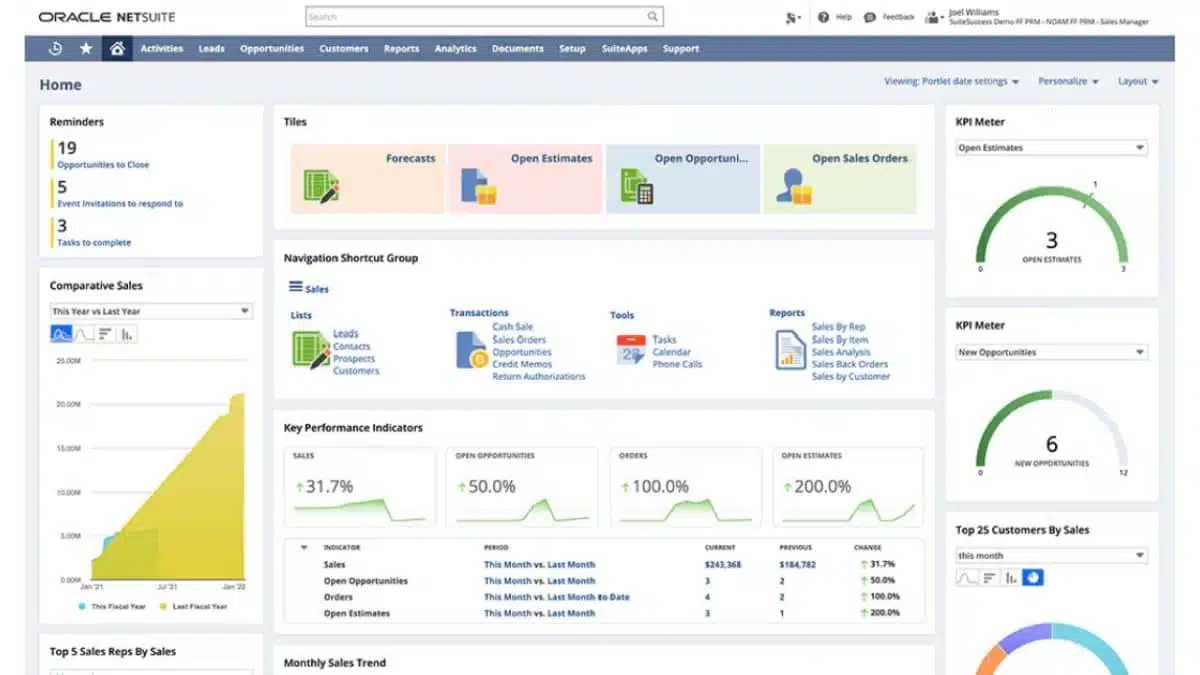
Oracle NetSuite is a global leader in ERP solutions, offering a cloud-based B2B ERP that combines real-time data with robust analytics. Known for its adaptability, NetSuite caters to various industries, providing tools that streamline operations and support business scalability in the Philippines.
Key Features:
- Real-time data access and analytics
- Customizable dashboards
- Multinational and multi-currency support
- Comprehensive CRM and eCommerce integration
| Advantages | Disadvantages |
| Real-time analytics | High initial setup costs |
| Excellent scalability options | Complex customization |
| Strong global support network | Requires regular maintenance |
| Integrated CRM and eCommerce |
4. SAP Business One
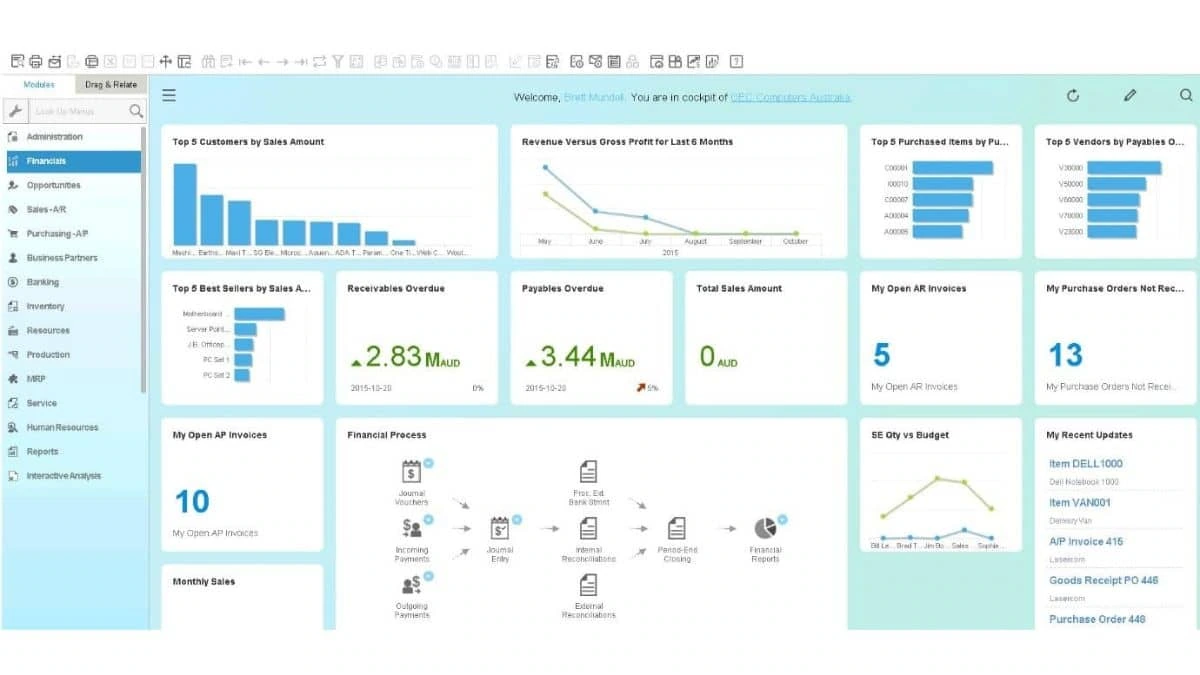
SAP Business One is renowned for its robust and versatile ERP solutions tailored to different industries. Focusing on manufacturing, supply chain, and finance, SAP Business One supports companies in optimizing their workflows, making it a strong contender in the B2B systems landscape in the Philippines.
Key Features:
- Strong manufacturing and supply chain tools
- Comprehensive financial management
- Customizable workflows
- In-depth reporting and analytics
| Advantages | Disadvantages |
| Specialized for manufacturing | It can be complex to implement |
| Advanced financial tools | Limited UI flexibility |
| Strong analytics and reporting | Requires training for full use |
| Flexible customization |
5. OrderWise

OrderWise offers a tailored B2B ERP solution emphasizing inventory, warehouse management, and eCommerce. Known for its robust features supporting offline and online businesses, OrderWise caters to businesses needing efficient stock control and order processing.
Key Features:
- Advanced inventory and warehouse management
- eCommerce integration for B2B transactions
- Strong reporting tools
- Reliable order management system
| Advantages | Disadvantages |
| Comprehensive inventory tools | Limited global customer support |
| Effective eCommerce integration | UI can appear outdated |
| Accurate reporting features | Setup can be time-consuming |
| Real-time order management |
6. Katana
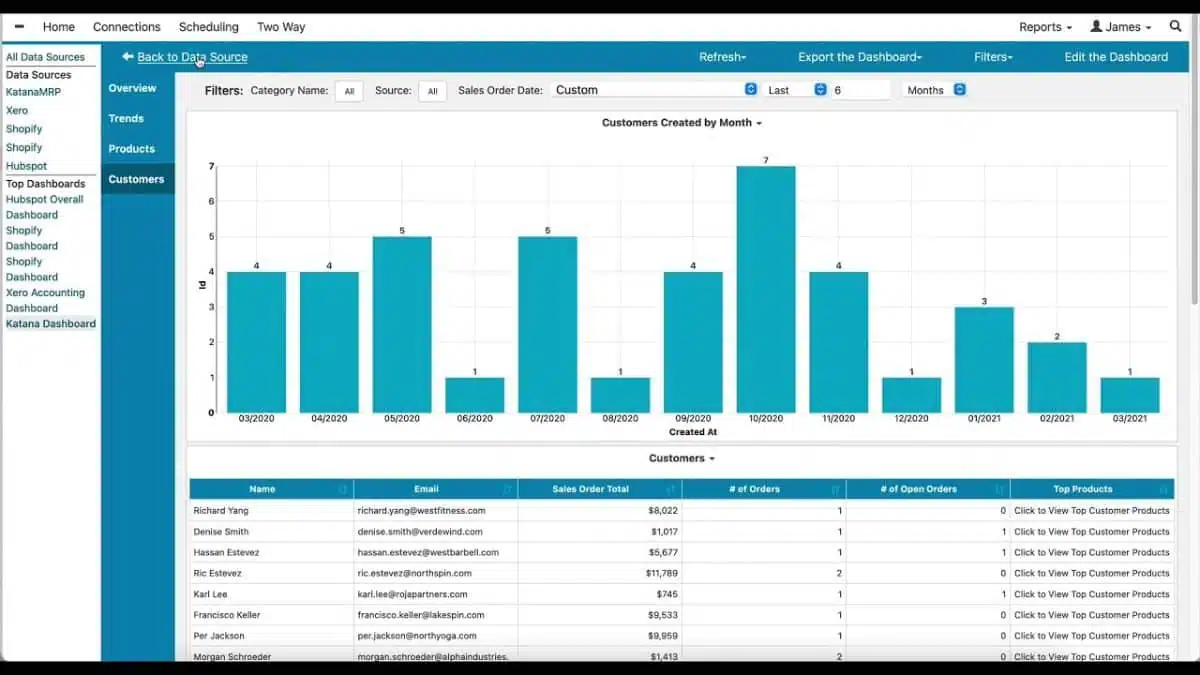
Katana ERP is designed for manufacturing and inventory management, providing real-time visibility and control over the production floor. Known for its modern UI and smooth user experience, Katana is a go-to solution for manufacturers looking for B2B ERP software that adapts well to changing demands.
Key Features:
- Real-time production tracking
- Easy inventory management
- Simple, modern user interface
- Multi-channel sales integration
| Advantages | Disadvantages |
| Modern and intuitive UI | Limited advanced features |
| Real-time production tracking | Limited customer support hours |
| Smooth inventory control | |
| Multi-channel sales support |
7. Traverse

Traverse offers a flexible B2B ERP system for diverse industries, focusing on finance, distribution, and manufacturing. Known for its affordable and customizable modules, Traverse provides a streamlined way for companies in the Philippines to manage their operations and improve efficiency.
Key Features:
- Strong financial management tools
- Effective distribution management
- Customizable reporting and analytics
- Industry-specific modules
| Advantages | Disadvantages |
| Highly customizable modules | Limited eCommerce integration |
| Strong distribution features | UI can be less intuitive |
| Excellent financial tools | Requires setup and customization |
| Flexible reporting |
8. Sage X3
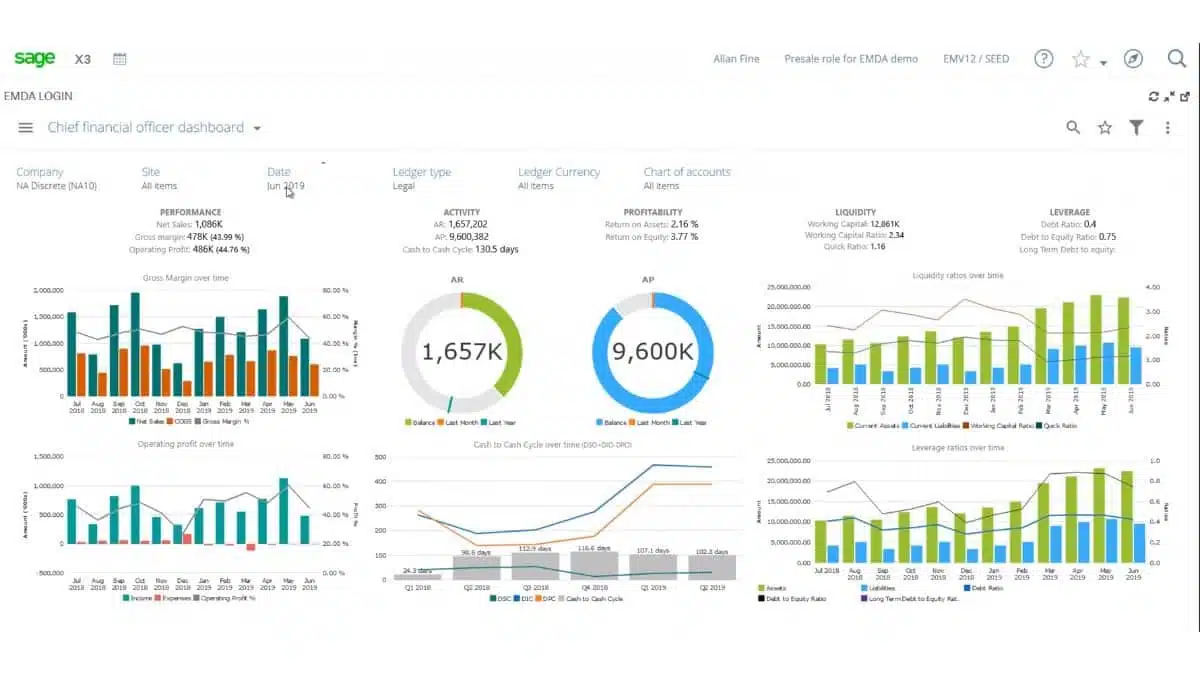
Sage X3 is a comprehensive B2B ERP solution that focuses on manufacturing, distribution, and finance. With its intuitive dashboard and high scalability, it is suited for businesses looking for a well-rounded ERP solution to optimize their complex workflows.
Key Features:
- Advanced manufacturing and distribution tools
- Customizable dashboards
- Scalable modules for business growth
- Real-time analytics and reporting
| Advantages | Disadvantages |
| Intuitive dashboard | Higher complexity for new users |
| Strong distribution management | Limited flexibility in UI |
| Scalable for growing businesses | |
| Comprehensive reporting tools |
These B2B ERP systems offer unique advantages to help Philippine businesses enhance productivity, improve data insights, and optimize daily operations. By selecting the right ERP software, companies can streamline processes, improve customer satisfaction, and stay competitive in today’s digital landscape.
B2B ERP Integration Challenges in eCommerce to Look Out For

Integrating a B2B eCommerce ERP system into existing operations can drive efficiency and streamline processes, but it’s not without its challenges. Recognizing these potential obstacles early on helps teams implement strategies to overcome them, ensuring a smooth transition and reducing disruptions that might affect productivity.
- Integration with legacy systems: Legacy systems often lack the capabilities for real-time synchronization and automated workflows, posing challenges for smooth B2B wholesale integration. These older systems may require costly and complex customizations to support high transaction volumes and seamless operations.
- Syncing issues: Data synchronization demands extensive testing and setup, especially for high transaction volumes and intricate data structures. Real-time syncing for critical data requires a strong network connection to avoid delays, while batch syncing demands precise scheduling to prevent performance lags.
- Security and compliance requirements: Integrating B2B eCommerce ERP systems exposes sensitive data to security vulnerabilities and compliance challenges, especially when third-party access is involved. Compliance with industry regulations, secure encryption, and regular audits are essential to protect customer and financial data.
- Data accuracy during migration: Migrating vast amounts of data, such as product catalogs and customer information, can lead to errors if formats or structures don’t align across systems. A thorough migration plan, including data cleansing and validation, helps ensure data accuracy and prevents loss during the transition.
By understanding and proactively managing these integration challenges, companies can unlock the full potential of their B2B ERP systems. This approach strengthens daily operations and empowers businesses to grow and adapt in a competitive eCommerce landscape.
Tips to Choose the Best B2B ERP Software for Your Business

Choosing the right B2B ERP software is crucial in boosting your business’s efficiency and growth. With so many options available, understanding your unique needs and matching them with the features of each ERP system can make the decision process smoother.
Here are some practical tips to help you find the best B2B ERP software for your business:
- Identify key business needs: Analyze your company’s needs, from supply chain visibility to sales tracking. Align these requirements with the features offered by B2B ERP systems to ensure a good fit.
- Prioritize task automation: Look for B2B ERP software that can automate routine tasks like invoicing, order processing, and payroll. Automation will save time, reduce errors, and boost overall efficiency in your operations.
- Evaluate reporting and data analysis capabilities: Strong reporting and data analysis are essential for tracking production, sales, and customer trends. Choose B2B enterprise software that provides comprehensive data insights to support strategic decision-making.
- Ensure real-time data tracking and visibility: A B2B ERP with robust data tracking allows you to monitor inventory, productivity, and supply chain processes. This visibility is crucial for identifying areas of improvement and maintaining operational flow.
- Look for integrated Customer Relationship Management (CRM): Select an ERP B2B solution that offers CRM capabilities to manage customer data and interactions. Integrated CRM helps better understand customer needs, enhancing overall satisfaction and loyalty.
- Check e-commerce integration compatibility: If your business involves B2B eCommerce ERP processes, choose a system that easily integrates with your eCommerce platform. This integration supports seamless data flow across platforms, enhancing the customer experience and operational efficiency.
- Assess customization options: Each business has unique requirements, so it’s crucial to choose B2B systems that offer customization options. This flexibility allows the ERP system to grow and adapt to your business needs.
- Evaluate customer support and training: Reliable customer support and training are key when implementing complex B2B systems. Ensure the ERP vendor provides accessible support and resources to help your team use the software effectively.
Conclusion
B2B systems, especially ERP solutions, are vital in streamlining operations and improving overall efficiency in today’s fast-paced business world. An ERP B2B solution integrates critical business functions—like inventory, sales, and finance—allowing companies to manage data seamlessly and support growth effectively.
One of the top options for Philippine businesses is HashMicro’s ERP B2B solution, known for its user-friendly interface and comprehensive features. HashMicro’s ERP System is designed to support B2B eCommerce ERP needs with tools for inventory management, financial tracking, and seamless integration across departments, boosting productivity and decision-making.
To experience the benefits firsthand, you can try HashMicro’s ERP system with a free demo. Discover how this powerful B2B enterprise software can enhance your operations and drive your business toward more tremendous success in a competitive market.

FAQ About B2B ERP
-
What are the different types of enterprise resource planning systems?
Enterprise Resource Planning (ERP) systems come in several types, each suited to different business needs and industries. The primary types include on-premises ERP, where the software is installed locally on company servers; cloud ERP, which is hosted online and provides remote access from any device; and hybrid ERP, a combination that allows businesses to choose which cloud-based functions are on-premises.
Industry-specific ERPs are also available and designed to address unique manufacturing, retail, healthcare, or services needs, providing customized features for optimized operations.
-
How do you integrate ERP software with an eCommerce platform?
Integrating ERP software with an eCommerce platform involves connecting your online sales systems with your ERP to streamline data flow between sales, inventory, and finance. This process typically requires an API (Application Programming Interface) or middleware to enable seamless communication between the ERP and eCommerce software, ensuring real-time data updates for orders, inventory levels, and customer details.
Careful planning and testing are essential for smooth integration, helping reduce errors and maintain accurate data across systems, ultimately enhancing customer experience and operational efficiency.
-
Do all ERP systems support B2B e-commerce integration?
TNot all ERP systems natively support B2B e-commerce integration, as some may be designed primarily for internal processes without specific eCommerce features. However, many modern ERP B2B systems provide eCommerce integration or can be customized to support it, enabling businesses to manage B2B transactions, track customer interactions, and automate order processing. If B2B eCommerce ERP is a key aspect of your business operations, evaluating an ERP system’s compatibility with eCommerce platforms is essential.
-
What are the Benefits of Using ERP Software?
ERP software offers numerous benefits, especially for B2B enterprises, by centralizing data and improving process efficiency. Key benefits include enhanced productivity through task automation, improved accuracy with real-time data synchronization, and better decision-making supported by comprehensive reporting tools.
ERP systems also streamline operations across departments, reducing redundant tasks and enabling businesses to scale efficiently while maintaining control and visibility over essential functions, from inventory to customer management.



